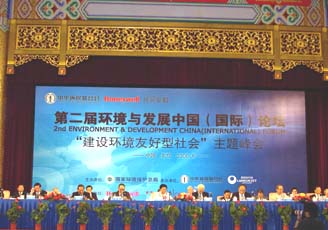| Home / English Column / Environment / Environment -- International Cooperation | Tools: Save | Print | E-mail | Most Read |
| Cross-cutting Challenges |
| Adjust font size: |
Diplomats and experts from the European Union (EU) are calling for the building of an environmentally friendly society and are urging all member countries to pay attention to the issue of environmental protection. Speaking at the Second China (International) Forum on Environment and Development yesterday in Beijing, H. D. Schweisgut, Austrian ambassador to China, said at the forum that environmental challenges are cross-cutting in nature.
"Thematic strategies dealing with air pollution, waste prevention and recycling, the marine environment, soil, pesticides, resource use and the urban environment, should be developed at all levels of political and economic activity," said the ambassador who was also speaking as the representative of the current European Union (EU) Presidency. The role of the government is crucial in this regard, he added. With its fast economic development, China is experiencing growing income disparities and a widening gap in development between regions. It is also facing severe environmental problems. The only way to sustainable development is for China to reconcile the need for continued dynamic growth, with greater balance and without further environmental degradation. "Building an environmentally friendly society is therefore not an option to be included in development plans, but a necessity in order to preserve a sustainable basis for growth and prosperity," he said. China has given priority to environmental protection in the 11th Five-Year Plan (2006-10). The country has set the target for reducing energy consumption per unit of GDP by 20 per cent and the target for cutting the discharge of major pollutants by 10 per cent during the period. These targets are designed to address the acute problem of mounting pressure on resources and the environment. They reflect the need to build a resource conserving and environmentally friendly society. The White Paper on Environmental Protection in China (1996-2006) issued early this month tries to strike a balance between development and environment. Environmental policy is also a top priority in the European Union. In the past few years, new technologies for environmentally friendly production and waste treatment, cleaner energy from traditional sources and a new focus on renewable energy, have led to innovation and productivity gains, which all have a positive impact on sustainable economic growth. However, environmental upgrading of industries in some of the new member states and accession candidates, where old industries have caused heavy damage, is a continuing challenge. "In the framework of the EU's regional and structural policies, a substantial part of project funding goes to the environment sector," he said. Environment policy in the EU is based on the assumption that high environmental standards stimulate innovation and business opportunities, according to another EU expert at the forum. Economic, social and environment policies should be closely integrated. The cornerstone of EU environmental action is an action program entitled "Environment 2010: Our Future, Our Choice". The focus on an environmentally friendly society as an essential element of the European economic and social model might also be of increasing interest to China today. An interesting example is the application of EU gas emission standards in China's automotive industry. "This is why the EU-China environmental dialogue is a crucial element of the EU-China strategic partnership," the ambassador said. At the EU-China Summit in September 2005, climate change was identified as an important field of common interest. Since then the following joint initiatives have demonstrated their participation in the environmental field: The Clean Development Conference sponsored by the National Development and Reform Commission and supported by the EU on October 20-21, 2005, in Beijing The Second International Renewable Energy Conference in Beijing, on November 7-8, 2005, resulting in the Beijing Declaration laying down a road map for renewable energy promotion worldwide The EU-China Seminar "Towards a Global Carbon Market: Using Market-Based mechanisms to Combat Climate Change" in Beijing on November 14-15, 2005 Bilateral consultations in the run-up to and during the Eleventh Session of the Conference of Parties (COP 11) of the UN Framework Convention on Climate Change, and the First Meeting of the Parties on the Kyoto Protocol (MOP 1) in Montreal from November 28 to December 9, 2005. (China Daily June 19, 2006)
|
| Tools: Save | Print | E-mail | Most Read |
 |
| Related Stories |
|
